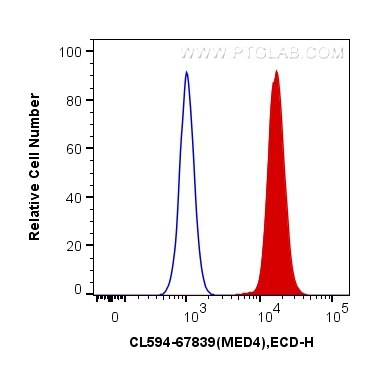CoraLite®594-conjugated MED4 Monoclonal antibody
MED4 Monoclonal Antibody for FC (Intra)
Host / Isotype
Mouse / IgG2a
Reactivity
Human, Mouse, rat
Applications
FC (Intra)
Conjugate
CoraLite®594 Fluorescent Dye
CloneNo.
2E6F4
Cat no : CL594-67839
Synonyms
Validation Data Gallery
Tested Applications
| Positive FC detected in | HepG2 cells |
Recommended dilution
| Application | Dilution |
|---|---|
| Flow Cytometry (FC) | FC : 0.40 ug per 10^6 cells in a 100 µl suspension |
| It is recommended that this reagent should be titrated in each testing system to obtain optimal results. | |
| Sample-dependent, Check data in validation data gallery. | |
Product Information
CL594-67839 targets MED4 in FC (Intra) applications and shows reactivity with Human, Mouse, rat samples.
| Tested Reactivity | Human, Mouse, rat |
| Host / Isotype | Mouse / IgG2a |
| Class | Monoclonal |
| Type | Antibody |
| Immunogen | MED4 fusion protein Ag8562 |
| Full Name | mediator complex subunit 4 |
| Calculated Molecular Weight | 270 aa, 30 kDa |
| Observed Molecular Weight | ~36 kDa |
| GenBank Accession Number | BC005189 |
| Gene Symbol | MED4 |
| Gene ID (NCBI) | 29079 |
| Conjugate | CoraLite®594 Fluorescent Dye |
| Excitation/Emission Maxima Wavelengths | 588 nm / 604 nm |
| Form | Liquid |
| Purification Method | Protein A purification |
| Storage Buffer | PBS with 50% Glycerol, 0.05% Proclin300, 0.5% BSA, pH 7.3. |
| Storage Conditions | Store at -20°C. Avoid exposure to light. Stable for one year after shipment. Aliquoting is unnecessary for -20oC storage. 20ul sizes contain 0.1% BSA. |
Background Information
MED4 is a component of the Meditor complex, which is a coactivator involved in the regulated transcription of nearly all RNA polymerase II-dependent genes. Meditor functions as a bridge to convey information from gene-specific regulatory proteins to the basal RNA polymerase II transcription machinery. It also have an alternative name called "Activator-recruited cofactor 36 kDa component (ARC36) ".
Protocols
| Product Specific Protocols | |
|---|---|
| FC protocol for CL594 MED4 antibody CL594-67839 | Download protocol |
| Standard Protocols | |
|---|---|
| Click here to view our Standard Protocols |


